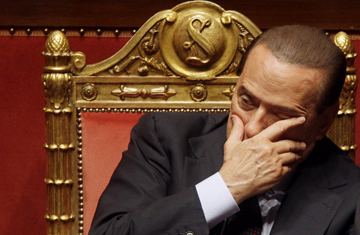
Italian Premier Silvio Berlusconi reacts after delivering his speech at the Senate, in Rome, Thursday, Sept. 30, 2010.
As far as birthday presents go, it wasn't a bad one. On Wednesday, Italian Prime Minister Silvio Berlusconi survived a parliamentary vote of confidence, giving new life to his governing coalition after a summer of acrimonious infighting.
But as his closest allies raised their glasses to the Prime Minister's 74 years later that night, the prosecco might have tasted a little flat. Berlusconi had hoped the vote would demonstrate that he no longer needed the group of rebel parliamentarians who broke with his party in July, but have since pledge conditional support. Instead, the result revealed just how dependent his government is on their cooperation. "It's not just about stability," says Allesandro Campi, director of Fare Futoro, a think tank closely linked to the rebels. "Formally, Berlusconi has the majority. The problem is: Will he politically be able to govern?"
For the past two months, Berlusconi has been wrestling with his former ally Gianfranco Fini, the speaker of Italy's lower house and leader of the rebel faction, known as Future and Liberty for Italy. It's the climax of long-simmering discord between the two, with Fini increasingly critical of Berlusconi's governing style and seemingly positioning himself to step into the top job should the Prime Minister fall. In his speech to parliament before the vote, Berlusconi struck a careful, conciliatory tone. But their escalating battles have left both with a feeling of — in the Prime Minister's word —"bitterness." On Sept. 25, Fini used a video address to answer allegations of corruption floated by Il Giornale, a newspaper owned by the Berlusconi family, and defended himself by suggesting his rival was behind the accusations and insinuating that Berlusconi uses offshore companies to pay less tax. "There's a strong tension between the two men," says Campi. "It's something that will be hard to forget or overcome."
Fini, a former rightwinger now widely considered a centrist, and his estimated 40 allies have said they will continue to vote with the government as long as it does not stray from its electoral platform. But Wednesday's vote showed that Berlusconi will need them if he's ever called to muster an absolute majority. The flashpoint could be the planned reform of the justice system and the Prime Minister's looming legal troubles. To secure Fini's vote on Wednesday, Berlusconi was forced to drop a motion that would have cut the statute of limitations on many trials, including two of his own. Later this year, Italy's constitutional court is thought likely to strike down a law that gives the Prime Minister immunity while carrying out the duties of his office. And while Fini has agreed to back changes in the constitution that would allow for the suspension of trials for top elected officials, the process could take many months, during which Berlusconi would be dangerously exposed.
The Prime Minister may have managed to keep his government from capsizing, but it's unlikely he'll find the strength to chart a new course. "If this is the way it is, better go to elections," Berlusconi told a close ally, according to Italian newswires. Until recently, Italian politics had seemed to be moving away from unruly coalitions of tiny squabbling parties and toward something approaching a two-party system — in which broad alliances came together before the polls in hopes of enjoying a more stable mandate. But the last government fell after just two years, and the current one has schismed. The country risks a repeat of its past, when governments rose and fell like the passing of the seasons. Fini, who has announced he will be officially forming a new party next week, has already suffered his first defections — two parliamentarians who joined the opposition in voting against Berlusconi on Wednesday.
For now, the main thing preventing a government collapse is the likelihood that the alternative is — for the protagonists — even worse. Fini's new party will need time to get off the ground, and it's unclear how Berlusconi would fare if an election were called too soon. In the meantime, Italians are left with a government adrift, parliamentarians consumed with positioning themselves for the next election, and an arthritic economy struggling to rise from the mat.
Over the past decade, Italy has averaged 0.7% growth, compared to a European average of 1.7% — which is adding weight to the country's heavy debt burden. Tangled in its political crisis, the government has not found the time to appoint a development minister, much less introduce the long-term changes the country so badly needs. "Until the political parties can begin to think more in terms of policies and less in terms of politics, it's extremely unlikely that we will see any progress on structural reforms," says Marco Annunziata, chief economist for UniCredit, the country's largest bank. For Italy, which is marking its own birthday this year —150 years as a united nation — there was little on Wednesday to celebrate.
